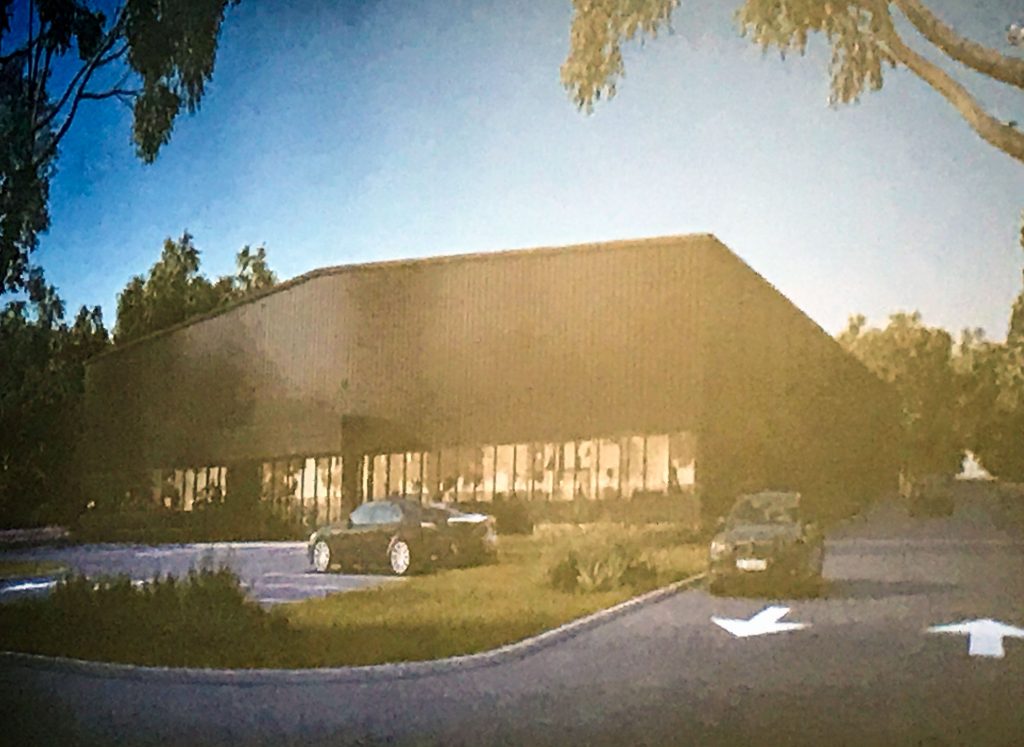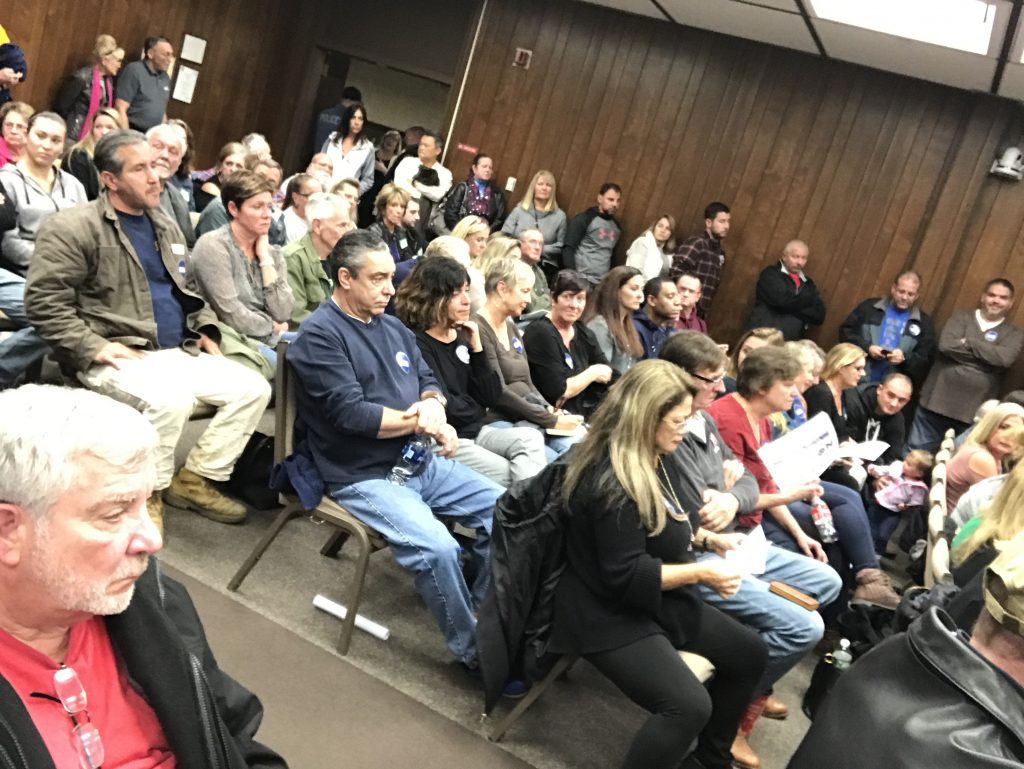
A crowd packed inside the Brick Township municipal complex for a Nov. 19, 2018 hearing on a medical marijuana dispensary. (Photo: Daniel Nee)
A crowd that was estimated to be between 200 and 300 people descended upon the Brick municipal courtroom Monday night to have their say at a hearing to determine whether a medical marijuana dispensary and grow house would gain approval. But before the meeting could begin, it was over.
Attorneys John Paul Doyle, representing Jersey Shore Therapeutic Health Care, the dispensary, and Edward Liston, an attorney representing four neighbors who object to the facility being operated in a residential zone, squared off before any witness could testify. Liston said the size of the crowd might violate the township fire code, and if even one person is excluded from the meeting, their constitutional rights and their rights under the state’s Open Public Meetings Act would be violated. Doyle characterized the overcrowding of the meeting as a plan hatched by the objectors to effectively filibuster the meeting with the hope that the dispensary owners would not receive zoning permits in time for state approval.
In the end, Board of Adjustment attorney John Miller strongly advised board chairman Harvey Langer and fellow board members to postpone the meeting until a larger venue could be secured. He agreed with Liston, stating that since some people were unable to enter the room and others left before the meeting started, the board’s decision – regardless of which way its members decided – would be thrown out in court if there were to be a challenge. Miller cited the case of Trap Rock Industries v. Hopewell Township, wherein a court vacated a land use board decision since some members of the public were unable to speak due to the size of the crowd.
|
|
“There are members of the public out there in the hallway,” said Miller, pointing to dozens of people who could be seen from the dais peering into the room and struggling to hear the conversation inside. “We don’t know whether there are more people coming in. It’s frustrates the constitutional rights given to the public, so I recommend that the board carry the hearing to another date in a larger facility to accommodate the public.”
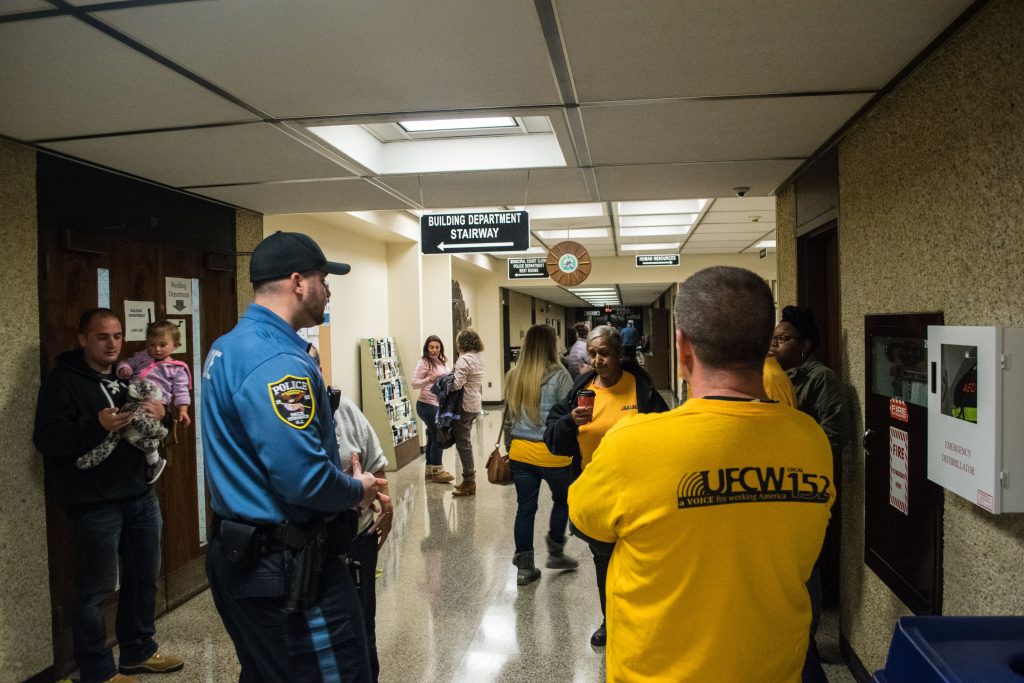
A crowd packed inside the Brick Township municipal complex for a Nov. 19, 2018 hearing on a medical marijuana dispensary. (Photo: Daniel Nee)
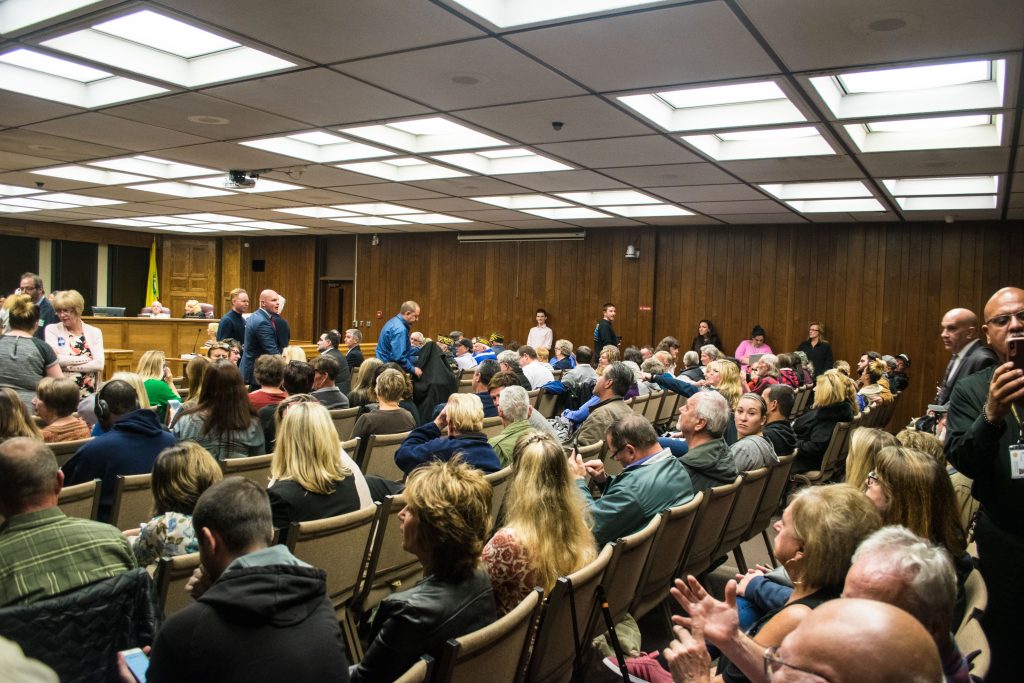
A crowd packed inside the Brick Township municipal complex for a Nov. 19, 2018 hearing on a medical marijuana dispensary. (Photo: Daniel Nee)
Supporters and detractors of the proposed medical cannabis dispensary, which would be located at 385 Adamston Road, were squarely separated by stickers that promoted their respective positions. Some wore green stickers that read: “I support medical marijuana in Brick.” Their opponents wore blue stickers that read: “Say no to Rezoning to a Medical Marijuana Dispensary.”
After about 20 minutes of discussion, Langer requested Daniel Newman, the township’s building official, come to the court room to certify whether or not the fire code had been broken. Newman said it had not, but Miller explained that some people had left, providing further proof that there was not enough room for every interested party to exercise their right to testify in front of the board. At one point, several medical marijuana advocates voluntarily left the room, sensing that the hearing might be canceled if there were too many people inside. There were occasional shouts from the audience and, at one point, a scuffle between two men broke out for a few seconds before cooler heads prevailed.
Testimony on the project began at a meeting last month. Since then, residents whose homes neighbor the proposed cannabis operation hired Liston and became better organized, printing signs and promoting the meeting date and time.
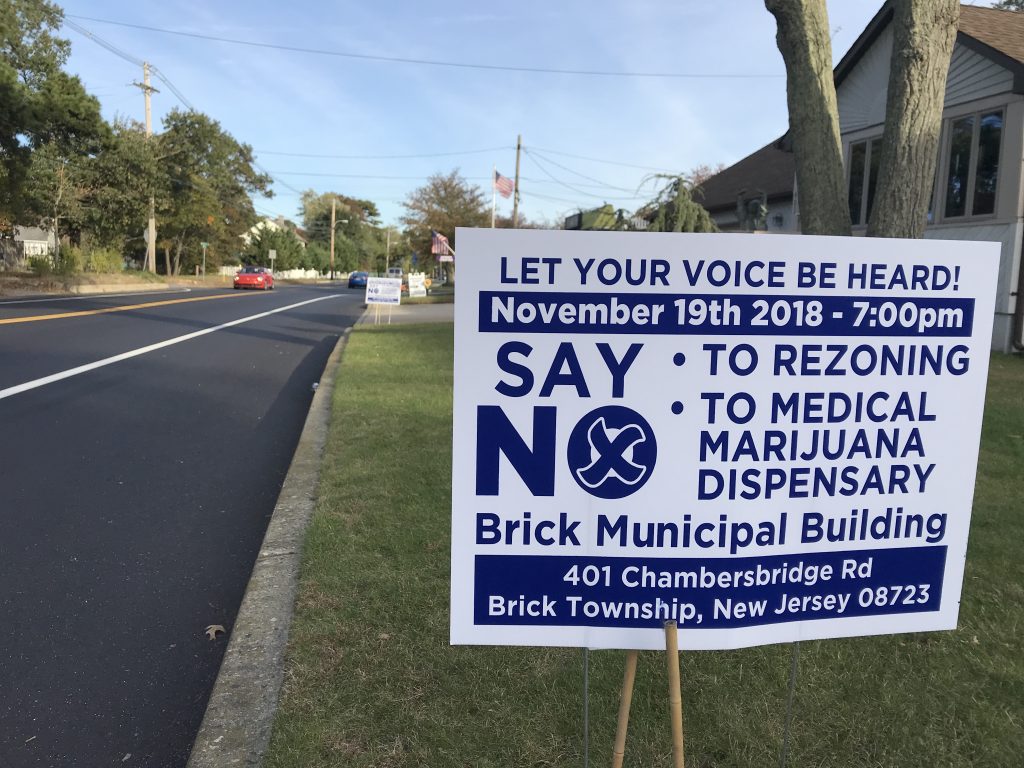
A lawn sign expressing opposition to a proposed medical marijuana dispensary in Brick, N.J. (Photo: Daniel Nee)
“I don’t believe it is any more crowded in this room tonight than the last meeting,” said Doyle, who attempted to call his first witness of the night – a man he described as a disabled veteran seeking a close-by medical marijuana dispensary – before Miller reiterated his plea to postpone the meeting. At that point, Langer polled the board and went with the majority opinion that postponement was the best option.
“This is an unfortunate situation but it happens frequently,” said Liston, who added that in the past few years, he represented clients in one matter that had to be moved to a high school auditorium due to public interest and another that necessitated the use of closed circuit television streams so members of the public gathered in a separate room could participate in the meeting. “The Open Public Meetings Act is very, very clear. Everyone in the room has a right to participate or not to participate if they choose. If it goes on and ultimately there is a challenge to the result … the whole thing is going to have to be done over again.”
Doyle view was a bit more cynical.
“There’s no mystery about this,” he said, pointing to the fact that opponents of the dispensary cheered after the postponement was announced as evidence that packing the meeting was part of a strategy. “It proves the point that that’s all they wanted to do.”
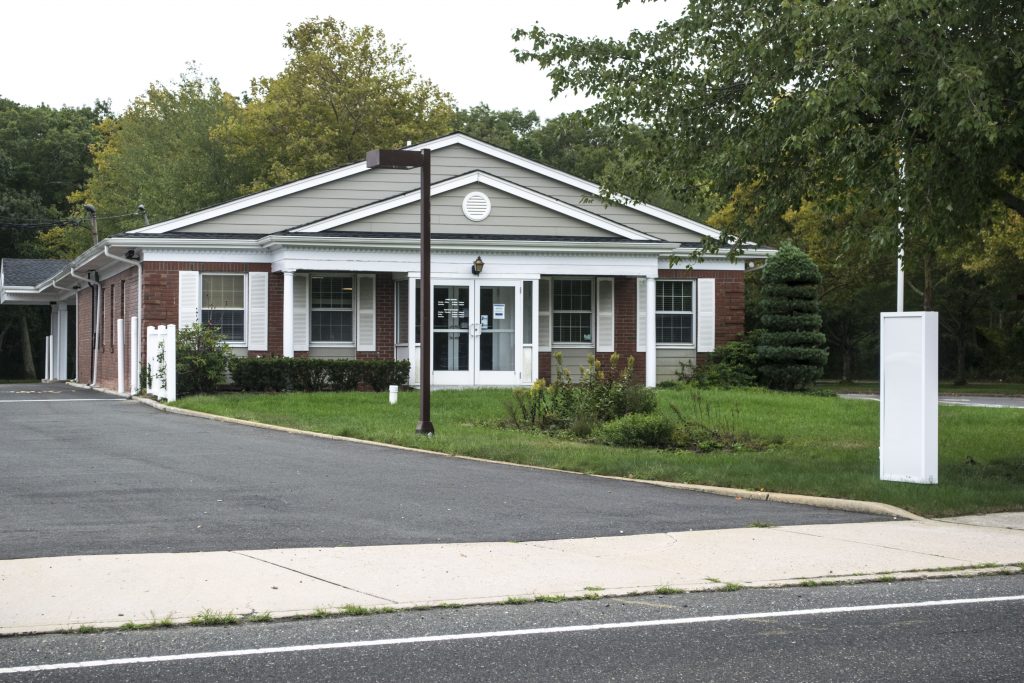
The location where a medical marijuana facility will be proposed in Brick Township. (Photo: Daniel Nee)
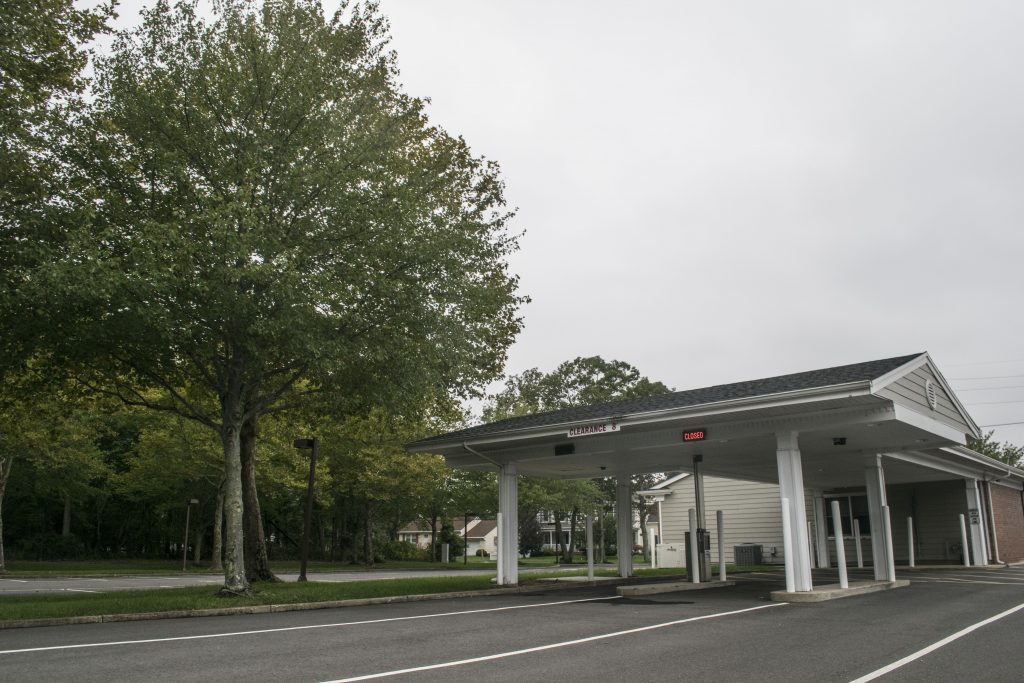
The location where a medical marijuana facility will be proposed in Brick Township. (Photo: Daniel Nee)
The dispensary will likely face a long legal road before a final decision is rendered as to whether the facility can be granted a variance to operate on a plot of land that, while zoned residential, has been used for a business purpose by a bank since the 1970s.
“This case is not going to end tonight,” said Liston. “It’s probably going to go on for another meeting or two, and it’s probably going to end up in court no matter who wins or loses.”
At the heart of the legal question is whether the dispensary meets the criteria set forth in the state’s Municipal Land Use Law to qualify for a variance. Its owners say the bank building is inherently secure and the plot of land is unique qualified for an agricultural use. But residents contend the business would draw traffic to the area, reduce their property values and pose a security risk. Some have also said the land is not suited for what they term an industrial-style growing facility.
In order to open for business, JSTHC needs both township land use approval as well as state medical approval. The state Department of Health had said it would issue six new medical dispensary licenses Nov. 1, but later announced it had not been able to comb through the 147 proposals in time to meet the deadline. Likewise, the state had set a Nov. 30 deadline for prospective dispensaries to receive local zoning approval, but it is largely believed that deadline has been abandoned as well.
Doyle, after the meeting, told Shorebeat that his client would continue with the hearing process despite the postponement.
“The state will make its calendar, and there is no certain knowledge that they might not adjourn it for a longer time,” he said. “The application will go forward.”
Miller said the Board of Adjustment would not be able to provide the public with a certain date for when the hearing would continue since a larger venue must be secured, but the date will definitely be after the new year. The board’s calendar is already extended into February 2019, however the applicant – at its own cost – could request a special meeting that would be dedicated to its own case. Public notices will have to be re-sent and re-published once a new date and location are chosen.
Doyle was frustrated by the decision.
“The neighbors have important rights, they should be heard, and they have an attorney to make sure they’re heard,” he said. “But my client should also be heard.”

Advertisement

Police, Fire & Courts
Grand Jury Indicts Point Pleasant Man, Once a Fugitive, for Attempted Murder

